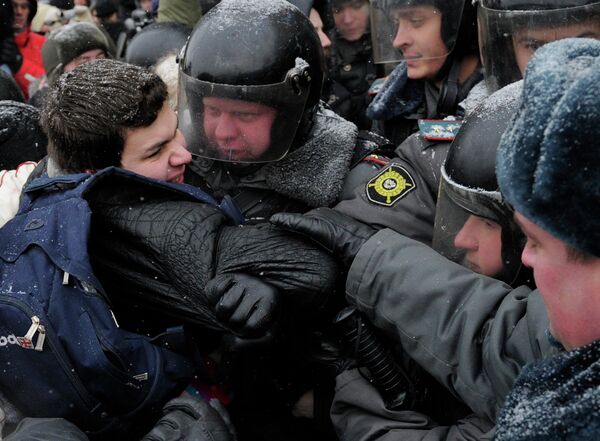At 16.32 on January 24 a suicide bomber blew himself up at Moscow's Domodedovo Airport. The news was first broken on Twitter at 16.44 after which international news sites picked up on the story. Almost two hours later, Russia's state-run TV channels announced the attack.
"Television is dead," was the response of many in Russia's growing army of bloggers. Others mocked Russian President Dmitry Medvedev, a self-proclaimed Twitter-addict, for allegedly learning about the blasts on the micro-blogging site.
With his near-constant chatter about Russia's innovative future, Medvedev is slowly waking up to the fact that many Russians now appear to be shunning state TV channels and embracing the free realms of the Internet. But the lightning effects of the so-called Twitter revolutions across the Arab world may be giving him cause for concern.
And so it should. The Internet has become one of the few outlets for political dissent in Russia and a recent blogger trend of uncovering the country's rampant corruption is gaining steam.
By far the ringleader of the trend is Alexei Navalny, a lawyer and blogger who in November accused former executives at Russia's state-owned pipeline company, Transneft, of embezzling around $4 billion of public funds during the construction of the East Siberian Pacific Ocean pipeline.
In December, the activist announced that he was collecting donations to fund a Wikileaks-style website, Rospil.info, to document corruption. He aimed to collect around $100,000 in a year. Within three hours the fund had amassed $5,230.
"Blogs like Navalny's are the future of Russian politics," said Dimitry Gudkov, chairman of the opposition youth organization Young Socialists of Russia, at An Internet forum in Moscow last week. "Today 18-20 million people are following blogs like Nevalny's, tomorrow this figure could be more like 40-50 million."
But an increase in Internet dissent does not necessarily mean an Egypt-style revolution is on the horizon. Writer and researcher Evgeny Morozov believes the Internet has just as much potential to breed complacency as it does to incite change.
"Young Russians spend countless hours online downloading videos and having a very nice digital entertainment lifestyle, which does not necessarily turn them into the next Che Guevara," Morozov told the U.S.-based Mother Jones magazine.
So far in Russia, the Internet has played a bigger role in quashing protests than spurring them on. During nationalist riots in December, the security services tracked blogs and social networking sites to trace people spreading nationalist sentiment and police quickly quashed planned uprisings announced on the web.
Navalny's movement has also fallen into difficulties. In late January, Rospil fell victim to a cyber attack and was shut down for several days, and a court case accusing Navalny of causing more than 1 million rubles ($32,000) worth of damage to a state-owned timber company was reopened last week.
Russia's political opposition, which holds regular small-scale protests in Moscow, is fragmented both on- and off-line and a handful of local activist groups scattered across the country are far from united.
The ruling United Russia party has also cottoned on to the growing power of the blogosphere and has allocated a budget to fund Internet campaigns and research.
"For many opposition movements, the Internet, while providing the opportunity to distribute information more quickly and cheaply, may have actually made their struggle more difficult in the long run," Morozov says.
But so-called Twitter revolutions are not born on the web, they just use it to take flight. Numerous parallels have been drawn between Russia and Egypt since the uprising began. Corruption, a massive wealth disparity, rising inflation, to name just a few. Some say it is only a matter of time before the ticking time bomb explodes.
MOSCOW, February 17 (RIA Novosti, Natasha Doff)
The views expressed in this article are the author's and do not necessarily represent those of RIA Novosti.




